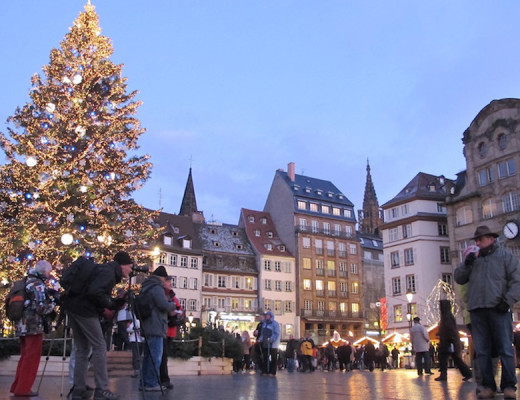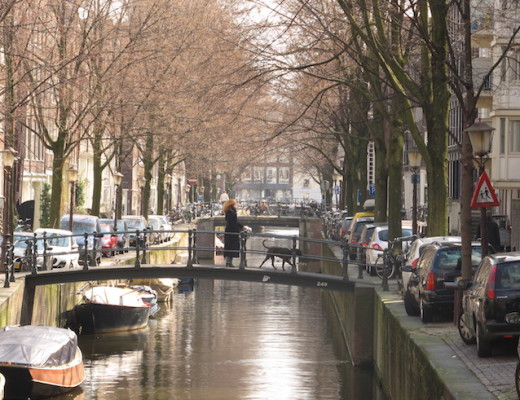“Here’s where they train the stupid police,” our taxi driver informed us in angry, broken English.
It was 3am and still dark. We were tired but curiosity and good manners won out over sleep. Arriving in the middle of the night was our only option. In an attempt to cut costs Yerevan’s cash-strapped airport limited flights during more sought-after daylight hours.
“Why are they stupid?” One of us asked.
“Corruption! Corruption!” He bemoaned with a sudden smile.
Soon we arrived at a nondescript concrete block, which we assumed was our guesthouse, but not before touching upon the topic of Russia: “Bad country.”
“Why?” We asked again.
“Agressive! Agressive!”
Rusted rebar grew out of the cracked staircases like roots of an urban Angkor Wat.
On the fourth floor our driver stopped and knocked on a door. A small woman answered with a smile — a sad smile, our imaginations later determined — and led us to our room in an upstairs apartment, speaking a mix of broken English, German and French.
“Welcome to Armenia.” She said and left.
Heavy furniture, white surfaces that had long yellowed, candlelight and old-fashioned fabrics had us suspecting that the space had not been redecorated for a century.
It was hot and dark. The power was out in the neighborhood and the sagging mattress enveloped us, making the temperature more stifling. Misshaped springs forced us to sleep on our backs like vampires. A woosh of warm air in the morning and the sound of water dripping from the AC told us that the power was back.
Truthfully, Armenia hadn’t even been on the list, but it was a more convenient stop than our ultimate destination: Georgia. Yerevan was hot, big and soviet, saved by a sprinkling of covered cafes, green parks and lively markets.
Storefronts mixed craft breweries and trendy wine bars with traditional coffee houses and Armenian grills. From the Cascade, the city’s main vantage point, we looked out over the dusty, August landscape and for the first time felt like we were closer to the Middle East than Europe.
In the days before our arrival we’d read that public frustration with the police was growing. Corruption! Corruption! seemed to be the gist. Attackers had taken hostages at a police station and by night the squares came alive with protestors, cameras and families.
The next morning, a crowded marshrutka (public minibus) took us north towards the border. After proudly presenting us with her homemade jam, our guesthouse host grew visibly disappointed upon learning that we would leave before exploring the ruins, ancient temples and rich cultural sites that had made Armenia a tourist destination. We didn’t have the heart to tell her that our visit had been the result of a €100 cut in plane ticket prices, so we promised we’d be back.

Over those next few days we were welcomed wherever we went. Smiles, nods and mentions of cousins in Glendale, California followed us, as did friendly Russian snippets, based on the assumption that Natalia and Boris would live up to their names.
We stopped in Debed Valley for the night, a canyon frequented by travelers looking to wander the damp, overgrown halls of long-abandoned churches and monasteries. This was our plan too, but luckily, we promptly got lost.
A group of men at a gas station noticed and one quickly waved us into his car to take us himself, a hospitable act that soon became a pattern.
After the 20-minute uphill drive — during which he occasionally handed us his cellphone to speak with his wife — he cringed and shook his head when we offered to pay him for the ride, an easy mistake to make in a country where the act of hitchhiking and catching a cab are nearly identical.
Alaverdi sits at the bottom of the gorge and is everything you would expect from a depressed mining town, with hints of a soviet golden era long gone, when the copper mines boomed to quench the demands of Russian buyers. Exit Russia and within a few years employed miners had dwindled from thousands to under 400.
We sat in plastic chairs drinking Armenian coffee next to a repair shop at the back of a parking lot, a sea of Ladas and unfamiliar Russian makes before us. A stray dog came and went. Taxi drivers milled about, then milled some more. After a few hours, we became part of an average Alaverdi afternoon. A Georgian and two Armenians joined us at the table, bringing bags of food and cans of beer. We “talked” until our signing skills ran out.
The city’s aimlessness was contagious, keeping us there until sunset, with a coffee, then a beer, then another.
Bleak and austere on the surface, scratch just a bit and the city brimmed with friendliness. Even the taxi drivers passed on the chance to hike rates for the only tourists around.
I wouldn’t say we’ve been to Armenia — our time there totaled four brief days — but it left an impression characterized by free rides, unsolicited assistance, attempted conversations, shared meals and generosity far richer than the country.





1 Comment
Jackie Hallerberg
September 30, 2016 at 5:34 pmWas glad to see your blog email come through this morning, Natalia. Thanks for helping me visit a place where I will probably never go. You always seem to make the best of it in any country. I love your last observation about “generosity far richer than the country.”